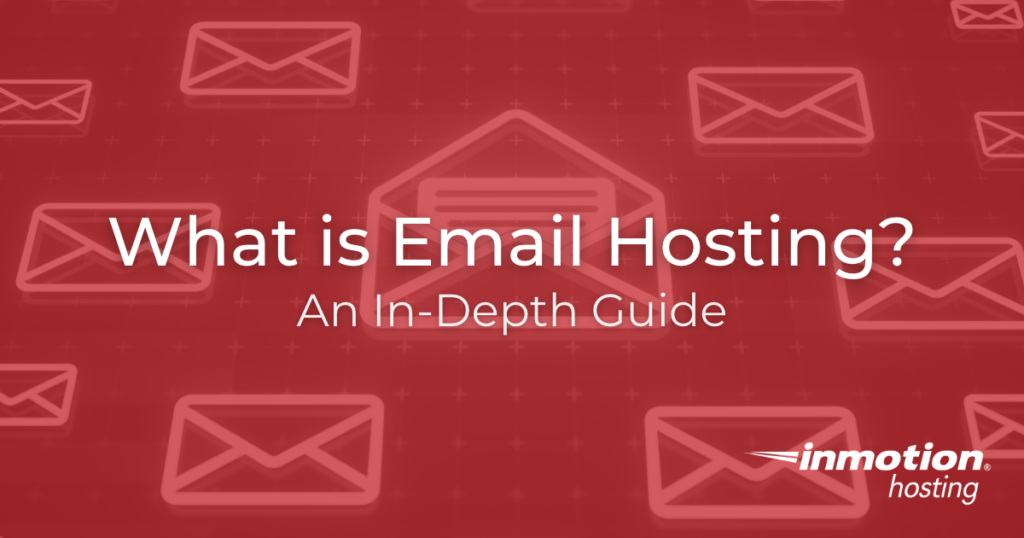
Email hosting is a service that lets you create and manage accounts using your custom domain. Unlike general web hosting or domain hosting, email hosting focuses solely on handling your email communications through specialized servers. This setup provides a level of personalization and professionalism you can’t get with free services like Gmail or Yahoo.
In this article, we’ll break down what email hosting is, its benefits, and key details to help you get started.
- What is Email Hosting?
- Why Professional Email Matters For Your Business
- Email Hosting vs. Web Hosting
- Email Hosting vs. Domain Hosting
- Drawbacks
- Third-Party Email Hosting
- Conclusion
- Getting Started: Email Hosting Checklist
What is Email Hosting?
Email hosting is a backend service that enables you to send, receive, and store email messages. Dedicated email hosting providers often offer enhanced security features, better storage options, and more robust support compared to free email services. These features can include spam filtering, custom filtering rules, and collaboration tools like shared calendars or file storage.
Professional email hosting allows businesses and individuals to create and manage email accounts using their own domain names. For instance, instead of using a generic email address like “example@gmail.com,” a company can have an email like “info@yourbusiness.com.” This not only enhances professionalism but also helps to establish a strong brand identity with each email sent. The ability to personalize email addresses fosters trust and credibility among clients and partners, significantly improving communication efficacy.
Why Professional Email Matters For Your Business
A professional email address is a vital component of your business identity. When clients and partners see a custom email domain, such as yourname@yourbusiness.com, they perceive your organization as credible and established. This small yet impactful detail can significantly boost your brand’s reputation, making it more likely for potential customers to engage with your services. A professional email not only enhances trust but also reflects your commitment to quality and professionalism, setting you apart from competitors who may use generic email services.
Professional email services like Google Workspace can contribute to streamlined team collaboration. With dedicated email hosting, businesses can leverage advanced tools designed to enhance communication among employees, such as shared calendars, task management, and integration with other productivity applications. This fosters a cooperative work environment and promotes efficiency. Without these capabilities, relying on generic email services can hinder effective teamwork and create unnecessary roadblocks, potentially affecting your productivity.
A professional email address is essential because it communicates your brand’s sophistication and dedication while supporting effective communication and collaboration within your business.
- Credibility and Trust: A business email adds legitimacy, showing customers that you are a reputable and established organization.
- Brand Awareness: An email address tied to your domain is unique, making it more memorable and reinforcing your brand with every interaction.
- Organization: A separate business email helps you keep personal and professional communications distinct, improving workflow and minimizing confusion.
- Scalability and Security: Business emails make it easy to set up accounts for new team members and deactivate them (along with access permissions) when employees leave.
Email Security and Compliance
Protecting sensitive business communications requires robust security measures. Professional email hosting provides multiple layers of protection including advanced encryption protocols, spam and malware filtering, and regular backups. When comparing email hosting to web hosting, it’s essential to recognize that dedicated email hosting services are tailored specifically for managing and securing email communications. This means businesses can access features that ensure compliance with regulations such as GDPR or HIPAA. A well-configured email hosting solution provides essential tools to monitor and safeguard sensitive data, allowing organizations to mitigate risks effectively.
Data Protection Features
- Enterprise-grade SSL/TLS encryption secures all email communications
- Advanced spam filtering prevents malicious emails from reaching your inbox
- Multi-layer virus scanning protects against email-based threats
Compliance Standards
- GDPR-ready email infrastructure
- HIPAA-compatible security features
- Regular security updates and patches
Switching to a professional email isn’t just about appearances—it’s a practical step to build trust, streamline operations, and grow your business effectively.
Email Hosting vs. Web Hosting
Businesses and individuals alike often find themselves at a crossroads when deciding between various hosting solutions. Two commonly discussed options are email hosting and web hosting, each serving distinct purposes yet sometimes creating confusion for those unfamiliar with their functionalities. Understanding the differences between email hosting vs web hosting is crucial for effectively managing online presence and communications.
Email Hosting
Email hosting provides services dedicated to managing email accounts, ensuring reliable delivery, and maintaining security for communications. This specialized service often includes features such as custom domain addresses, spam filtering, and additional storage. By opting for an email hosting provider, businesses can project a professional image while enjoying enhanced organization and collaboration tools.
Web Hosting
Web hosting is a service that provides the physical server space required to make your website accessible on the internet. These servers store your website’s files, which can include everything from text and images to applications and software. When someone visits your website, their browser retrieves these files from the server to display the content.
While both email hosting and web hosting are fundamental components of an online presence, they cater to different needs. Choosing the right solution primarily depends on the specific requirements of a business or individual. For example, a small business might prioritize email hosting to establish a credible communication channel with clients, while a larger organization may need robust web hosting capabilities to manage a complex website with heavy traffic.
Ultimately, the decision between email hosting vs web hosting emphasizes the need for clarity in what each service provides. Recognizing that these are not interchangeable solutions allows users to tailor their online strategy effectively, ensuring that both communication and website functionality are optimally addressed. Properly leveraging both services can significantly enhance a company’s operational efficiency and brand image.
Do I Need Email Hosting and Web Hosting?
While web hosting focuses on making your website visible online, email hosting is designed to support professional and reliable email communication. Both services can often be bundled together, but they operate independently to fulfill distinct roles.
All of InMotion Hosting’s Shared hosting, WordPress hosting, Reseller hosting, and VPS hosting plans come with email hosting already set up and ready to go on the same server as your hosting account! You can start creating new emails as soon as you access your account, and can even migrate emails from a previous hosting plan over to InMotion.
Email Hosting vs. Domain Hosting
If your primary focus is email rather than a website, you’ll still need domain hosting to secure your custom domain. Once your domain is registered, you can pair it with an email hosting provider to start using branded email addresses.
What is Domain Hosting?
Domain hosting refers to the service of registering and managing your domain name, the unique web address people use to find you online (e.g., yourdomain.com). The domain hosting provider ensures your domain remains active and properly connected to other services like your website or email hosting through DNS (Domain Name System) records.
Domain hosting is solely about registering and managing your domain name’s DNS records, therefore it doesn’t involve storing your data or files for a website.
Since a domain is required to create a custom email address, domain hosting serves as the foundation of your online presence. It ensures that your domain is properly registered, maintained, and ready to connect seamlessly with essential services like email hosting or web hosting.
Limitless Opportunities Begin with the Right Domain Name
Your domain is the foundation of your online journey. Whether you're launching a business, blog, or personal portfolio, find the perfect domain that aligns with your goals and aspirations.
.com
.agency
.cloud
.shop
and many more
What are the Drawbacks of Email Hosting?
Email hosting provides significant benefits, but it’s important to understand the potential challenges as you research and compare services. Here are a few considerations to keep in mind:
Cost
Email hosting costs vary based on whether you use a third-party provider or a premium add-on from your web host. Costs can increase as you require more features, such as additional storage, advanced security, or custom integrations.
IP Reputation
In shared server environments, your email deliverability may be affected by the actions of other users sharing the same server IP, such as sending spam. For VPS Hosting or Dedicated Server plans, maintaining IP reputation becomes your responsibility, often requiring monitoring by your development or IT team.
Limited Storage
Many email hosting plans come with strict storage limits, which may not be sufficient for growing businesses or high-volume users. Be sure to check the storage specifications and features when selecting a plan.
Migration Limitations
Moving email data between providers can be complex and time-consuming. Migration issues, such as temporary downtime or data loss, may arise if the process isn’t carefully managed.
By keeping these factors in mind, you can better assess which email hosting solution aligns with your business needs and plan for potential challenges.
Third-Party Email Hosting
Third-party email hosting providers focus exclusively on email services, offering robust infrastructure and a user-friendly experience.
Providers like Gmail and Outlook are already widely recognized and trusted, making them a natural choice for many businesses. Additionally, these services often guarantee higher reliability and uptime, supported by advanced IP monitoring systems to maintain email deliverability and performance.
If you’re already using a well-established third-party email hosting service, it’s understandable to be hesitant about changing your workflow. At InMotion Hosting, we make it simple to integrate your web hosting with third-party email providers like Google Workspace or Office 365. This flexibility ensures you can continue using the tools you’re familiar with while leveraging reliable web hosting for your website.
To learn more about setting up email with InMotion Hosting, explore our comprehensive list of email-related resources!
Conclusion
Email hosting offers enhanced security, regulatory compliance, and tailored solutions that are critical for businesses dealing with sensitive information. By investing in the right email hosting services, organizations can protect their communications, maintain client trust, and comply with the necessary legal frameworks.
Getting Started: Email Hosting Checklist
Getting started with professional email hosting requires a few key setup steps. Investing time into the proper configuration of email hosting is a critical step toward establishing reliable email delivery and secure communications for your business.
Essential Email Hosting Configuration Steps
- Confirm domain ownership and access
- Point domain DNS records to email servers
- Configure MX records for proper mail routing
- Set up SPF records to prevent email spoofing
- Establish DKIM authentication for enhanced security
- Configure spam filters
- Set up authentication protocols and enable SSL/TLS encryption
- Create strong passwords and enable two-factor authentication
- Set up email forwarding rules
Configure Your Email Client
There are many ways to access your professional email for sending and receiving, such as:
- Desktop email clients using IMAP or POP3
- Mobile devices with secure sync options
- Web-based email interface for anywhere access
- And don’t forget to set up your email signatures for each platform
Integrate with Your Hosting Plan
Professional email hosting seamlessly integrates with your existing hosting infrastructure. This unified approach simplifies management and enhances performance.
- Instant email setup with new hosting accounts
- Unified control panel for website and email management
- Streamlined DNS configuration
- Automatic security updates
Integrating email hosting into your current InMotion Hosting setup provides numerous advantages. With a single control panel for both web and email services, managing your business communications becomes much more efficient. You can create and manage email accounts, set up forwarding, and apply essential security protocols without having to navigate multiple platforms. This seamless integration not only saves time but also reduces the risk of miscommunication or missed messages—an essential factor in maintaining client relationships.
If you’re a business that’s looking to elevate its operational efficiency and brand authority, choose InMotion Hosting for all your email, website, and domain hosting needs.
